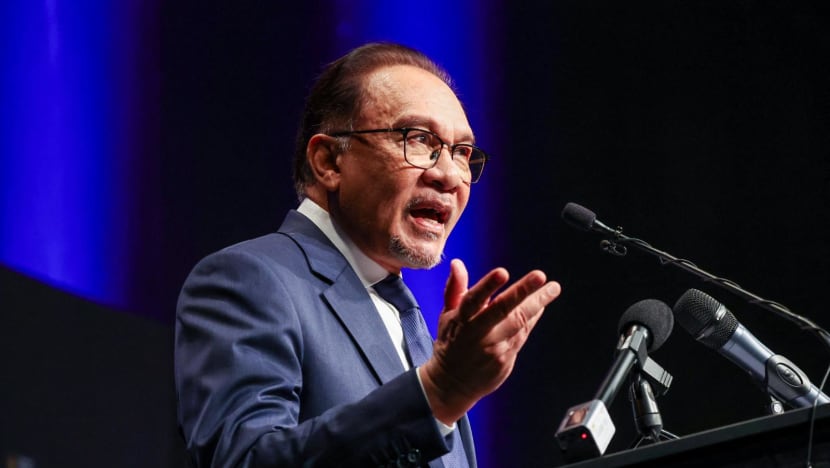Commentary: Malaysia is pushing the chips in on neutrality
Malaysian Prime Minister Anwar Ibrahim has put forth a proposition for countries seeking a “neutral and non-aligned location” amid the escalating US-China technology war: Choose Malaysia for semiconductor production, say these experts.

KUALA LUMPUR: US-China competition resulting in economic and technological decoupling is motivating small and middle powers to create middle-ground alternatives.
In that context, Malaysian Prime Minister Anwar Ibrahim has put forth a compelling proposition for countries seeking a “neutral and non-aligned location” amid the escalating US-China technology war: Choose Malaysia for semiconductor production.
Anwar’s move underscores Malaysia’s aspiration not only to navigate through turbulent global economic waters but also to thrive in it.
INVESTING IN SEMICONDUCTORS
Central to the Malaysian proposal is the recently introduced National Semiconductor Strategy, under which the Malaysian government will invest RM25 billion (US$5.33 billion) to transform the nation into a global semiconductor hub.
Plans are underway to develop an integrated circuit design park in Selangor and a “Silicon Island” off the coast of Penang. These projects reflect Malaysia’s efforts to not only position itself at the forefront of the global semiconductor industry but also create new alternatives away from China and the United States.
Malaysia’s bid to attract investments beyond the US-China rivalry is not unique, but the country is well-positioned to succeed. Despite lacking a large domestic market, Malaysia offers excellent infrastructure and connectivity, a reliable and skilled workforce, an extensive network of free trade agreements, and pro-business policies. Domestic political challenges appear to be dissipating, further enhancing Malaysia’s appeal as a stable and attractive investment destination.
That said, Malaysia’s neutrality claim would attain more credibility if Anwar embraces the Indo-Pacific construct with the same zeal. The US-China competition, particularly over Taiwan and the South China Sea, continues to pose significant risks.
Still reeling from the global economic disruptions from the Russia-Ukraine war and the COVID-19 pandemic, US-China decoupling strategies are contributing to an increasingly fragmented global trading system. Malaysia, with its highly open economy and strategic location in the Indo-Pacific region, stands to lose considerably if tensions escalate.
Naturally, as with other small and middle powers, Malaysia wants to ensure its economy remains insulated, or at worse, resilient to these challenges. By providing an avenue for alternative supply chains to develop, it reduces the risk of disruption which was one of the major factors affecting the Malaysian economy in recent years.
PURSUING DE-DOLLARISATION
Anwar has also been a vocal advocate for the establishment of an Asian Monetary Fund as a regionally focused finance institution, along with the pursuit of de-dollarisation to ensure that the international financial architecture is not dominated unfairly by Western powers.
Motivations for de-dollarisation are multi-faceted. They range from reducing a country’s exposure to the negative impact of “error-fraught monetary policy” to the continued weaponisation of the US dollar, for example, with sanctions.
Rising economies such as India are already taking steps to trade in their currencies, as was illustrated by the recently signed Malaysia-India agreement to trade in Indian rupees. Saudi Arabia’s decision to stop oil trading in the US dollar and open itself up for trade in other currencies is the most recent indication of this trend.
In Malaysia’s case, the goal would include insulating itself from the adverse effects of erratic US monetary policies, but also as a means of strengthening the ringgit which has never regained its pre-1997 levels.
While de-dollarisation and an Asian Monetary Fund may not immediately challenge the dominance of the US dollar or existing international institutions, they offer small and middle powers such as Malaysia greater flexibility and autonomy. These initiatives are designed to mitigate potential fallout from geopolitical rivalry and to shield Malaysia from uncertainties should the competition intensify.
JOINING BRICS+
Recognising the divisive nature of the US-China competition, Anwar has also called for a more cohesive and assertive ASEAN. As chair of ASEAN in 2025, Malaysia is afforded a prime opportunity to push for deeper integration and perhaps even more de-dollarisation.
Considering ASEAN’s history of institutional inertia may pose challenges, Malaysia is moving ahead with plans to join BRICS+, an inter-regional organisation where such ideas may find more traction. Malaysia’s participation will certainly add value to an organisation that already represents 37.3 per cent of global GDP, and in terms of gross domestic product (GDP) in purchasing power parity (PPP) is reported to have surpassed the G7 grouping. With other ASEAN members such as Thailand also showing interest, Indonesia may be encouraged to re-consider membership.
Malaysia’s ambition with BRICS+ may be viewed by some as a sign the country is tilting towards China. But such an assessment would be victim to a false dichotomy. Taken as a whole, Malaysia’s policies in pursuit of the National Semiconductor Strategy, the Asian Monetary Fund, and de-dollarisation initiatives all reflect a desire to enhance Malaysia’s economic resilience, independence, and to protect itself from the geopolitical machinations of great power politics.
These efforts can additionally contribute towards Malaysia’s broader vision of a more balanced, equitable and democratised international order. Greater partnership with like-minded countries in ASEAN, BRICS+, and the wider Indo-Pacific region, including India, and Saudi Arabia, may greatly assist Malaysia in its endeavours.
Peter Brian M Wang leads the economics subcentre at the National Institute of Public Administration (INTAN), Malaysia. Dr Rahul Mishra is Senior Research Fellow at the German-Southeast Asian Centre of Excellence for Public Policy and Good Governance, Thammasat University, Thailand. This commentary first appeared on Lowy Institute’s blog, The Interpreter.

















